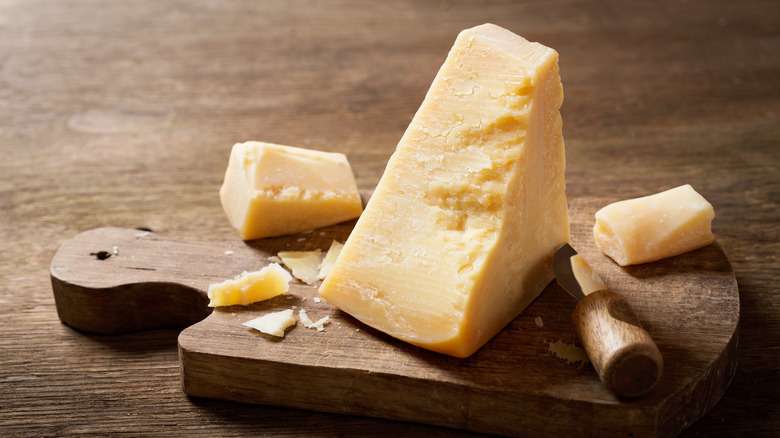The Reason Saltier Cheeses Don't Make For A Good Sauce
A cheese sauce is a beautiful thing when it's done right. Whether it's queso or a fancy mornay, the best cheese sauces are smooth and creamy while still being thick enough to coat the side of a chip or french fry. Unfortunately, a lot of things can go wrong when you're making this dip, from it congealing into a rubbery paste or ending up gritty and grainy. And the surefire way to end up with these results is to start with the wrong kind of cheese. In particular, salty varieties are notoriously bad at melting.
It's not so much the sodium itself that messes with the melting, as it is the aging that creates salty cheeses. Salty, aged varieties gradually lose moisture, which is why older cheeses like Parmigiano Reggiano are more solid and have such a concentrated flavor. Moisture is extremely important in getting the right texture for a cheese sauce because it needs to maintain a balance between water and fat to stay smooth. With enough moisture, a cheese can melt without breaking down structurally. However, in the low-moisture salty kinds, there isn't enough water to maintain the balance of the emulsion at high temperatures, so the cheese separates without melting.
Salty cheeses have gone through aging that breaks them down
So, if you're looking for a cheese that will turn into a perfect sauce, you want to find something younger, softer, and with higher moisture. The one category that's an exception is really fresh milky cheeses like ricotta and feta; these have extra acid that inhibits melting, so avoid them. Instead, aim for semi-soft cheeses like younger cheddar, jack, or the melting all-star: American. If you want a unique flavor for your sauce while still getting a smooth, creamy finish, young Gouda and Gruyère are great options too. The one common melting cheese that actually isn't ideal for cheese sauce is mozzarella, which is produced in a way that makes it get stretchy when heated rather than becoming a gooey liquid.
That doesn't mean you can't use salty cheeses at all in a cheese sauce, but you either need to use them in a supporting role, or bring in extra ingredients to account for the loss of moisture and structure. You can use a good melter like those mentioned above for the majority of your cheese, and grate in Parmesan or aged cheddar as a complement. Adding liquid or starch, through milk or a roux, can also help keep sauces with salty cheeses smooth and stable. But as a general rule, if you want a luxuriously smooth cheese sauce, keep the salty cheese to a minimum.

